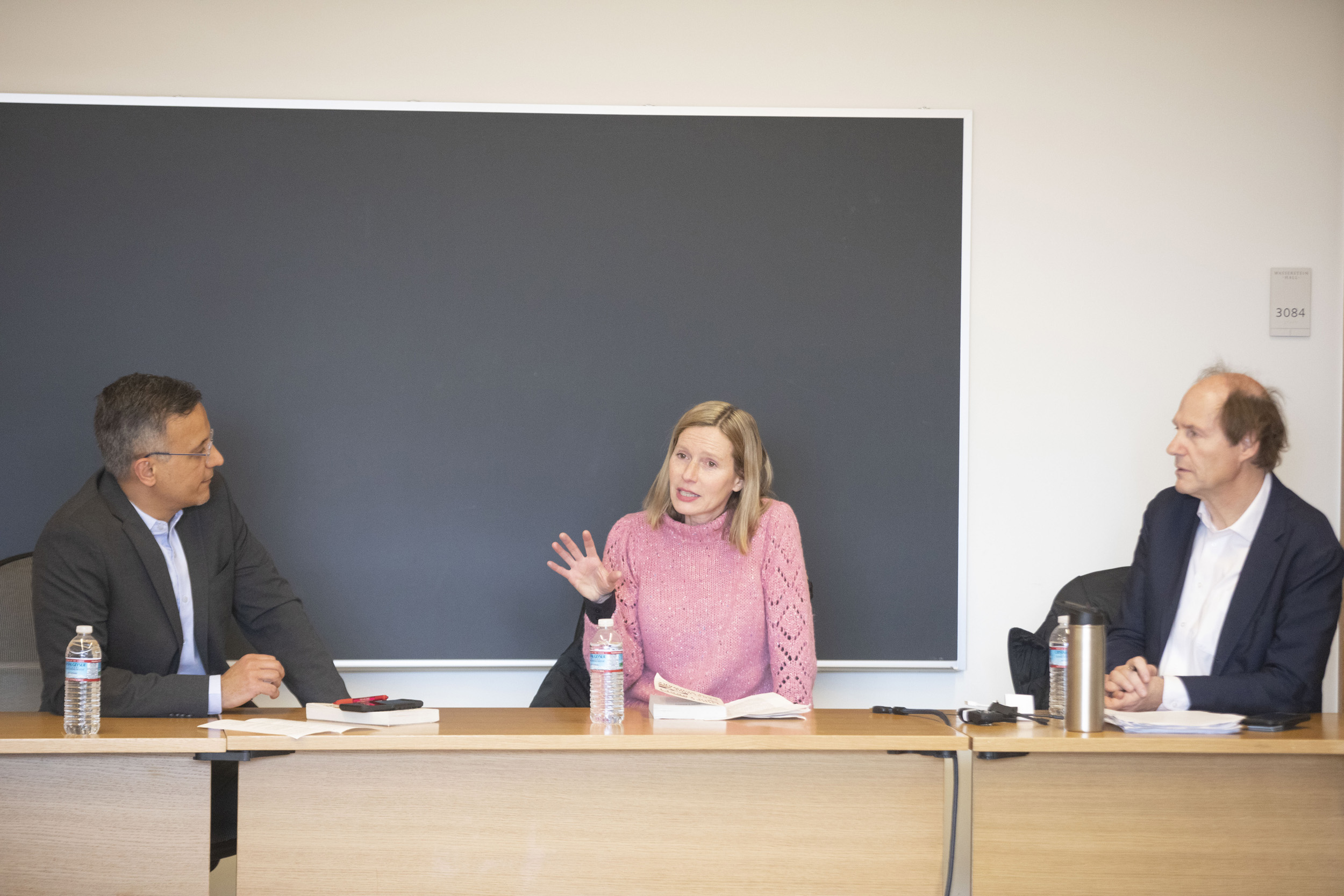
Géraldine Schwarz (center) spoke at Harvard Law School with Abadir Ibrahim (left), associate director of the Human Rights Program, and Cass Sunstein, Robert Walmsley University Professor.
Kris Snibbe/Harvard Staff Photographer
Not-so-innocent bystanders
Journalist shares story of grandparents who ‘followed the current’ in Nazi Germany
In Nazi Germany, Géraldine Schwarz’s grandparents lived like many of their neighbors. They were not active participants in the genocidal war machine, but they didn’t oppose it, either. They took their place among the “Mitläufer” — those who follow the current. In doing so, they helped support the slaughter of millions of Jews and became Hitler’s accomplices, Schwarz says.
The author of “Those Who Forget: My Family’s Story in Nazi Europe” spoke Tuesday at the Harvard Law School in an event co-sponsored by the Human Rights Program at Harvard Law School and HLS Advocates for Human Rights.
Schwarz, a Berlin-based journalist, said she wrote the book as a contribution to the culture of remembrance in Germany, where confronting the horrors of the Holocaust and acknowledging societal responsibility are considered by many a duty of everyday life.
“In Europe, we tend to divide the attitude of society during World War II in three categories: perpetrators, heroes, or victims,” said Schwarz, the daughter of a German father and a French mother. “We forget about the Mitläufer, who were one of the major actors responsible for the consolidation of the Third Reich.”
Remembering those who go along with government crimes is important because none of us can claim immunity, says Schwarz. In sharing the story of her family’s past, she hopes that readers and listeners realize how easy it is for any citizen to become complicit in acts of terror.
“As a reader, you cannot really identify with perpetrators or monsters,” said Schwarz. “But you can imagine being my grandfather. You can imagine that, out of opportunism, you might become the accomplice of a criminal regime.”
“Most of German society, after the war, was in total denial of their responsibility to the point that they considered themselves as victims.”
Géraldine Schwarz, author of “Those Who Forget: My Family’s Story in Nazi Europe”
Schwarz discovered that in 1938, her grandfather, a member of the Nazi Party, exploited anti-Semitic policies and the persecution of Jews to underpay for a business owned by a Jewish family. In later letters to the family’s only survivor, her grandfather refused to pay reparations.
“You can see that he’s in total denial of his responsibility as a Mitläufer under the Third Reich,” said Schwarz. “And most of German society, after the war, was in total denial of their responsibility to the point that they considered themselves as victims.”
German citizens benefited from Nazi policies by filling jobs once held by Jews, taking over Jewish-owned businesses, and participating in furniture auctions in the homes of Holocaust victims. Finding ads for these auctions was a particularly disturbing moment in her research, Schwarz said.
“That really shocked me. Many Mitläufer in Germany became so out of blindness. Sometimes, you don’t want to understand what’s going on; you want to blind yourself. But when you go to the flat of a neighbor — whom you had known, who was deported — and you buy his belongings, you cannot pretend to be blind anymore.”
Schwarz decided to write her book back in 2017, when the far-right party Alternative für Deutschland, AfD, won seats in the German Parliament. She was worried that the rise of populist parties in France, Italy, and other European countries represented a desire to forget the lessons of World War II.
To avoid repeating history, we must remember and acknowledge the complicity and atrocities of the past, Schwarz stressed. Opting to go along with the political current, out of convenience or indifference, poses a risk to democracy and peace, she said.




